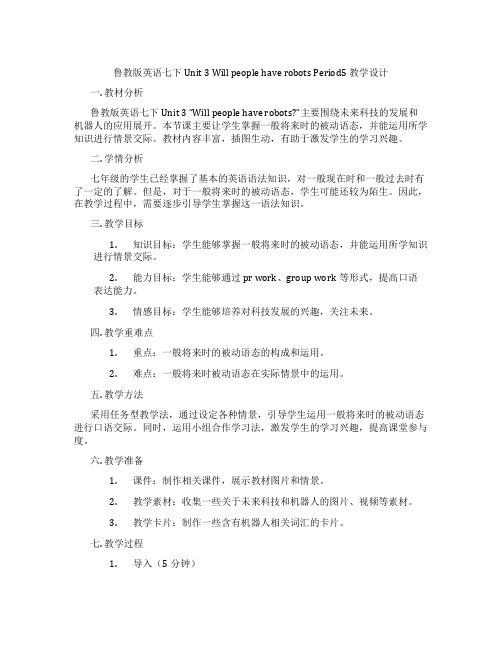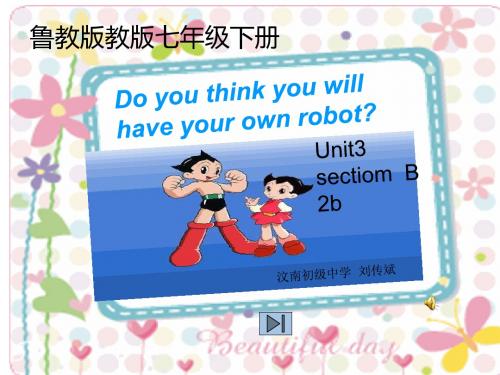(新)鲁教版七年级英语下册:Unit 3 Will people have robots?Section A (2d—3c)精品课件
Unit3-Will-people-have-robots的说课稿

七年级英语下册Unit3Reading说课稿Good morning,everyone。
I’m glad to have an opportunity to talk about some of my teaching ideas。
My topic is made up of four parts。
我的话题是鲁教版七年级下册第三单元SectionB---reading,题目为Do you think you will have your own robot?本课又是学生接触的一篇较长的阅读课文。
无论在知识含量还是在阅读技能的培养上都是重点,这篇课文的冗长,对机器人知识的匮乏都是学生理解和阅读中的难点也是教师上课的难点。
因此需扩展相应知识,教授阅读方面技巧,从而提高阅读能力。
一:教材分析:本节课是初二英语下册Unit 3 Will people have robots?Section B部分的内容,本单元所谈论的话题是谈论未来的世界。
Section B是在Section A基础上的拓展.2a—2e是一个整体的阅读板块。
该单元阅读语篇谈论的是未来机器人的发展的话题,其中涉及到机器人过去和现在的状况,并主要介绍了两派科学家催未来机器人的发展的不同的预测。
通过2a的读前活动到2b-2d读中活动再到2e的读后讨论拓展活动,比如匹配段落大意、将句子放回原文、根据原文内容回答问题、进行拓展性语言训练和运用等任务链活动,旨在帮助学生在掌握语篇信息的同时,发展相应的阅读技能,提升阅读策略。
二:学生学情分析:三:教学目标分析:教学目标:根据新课标的教学理念,从素质教育的要求出发,结合本课的教学内容和学生的语言水平,本节课的核心任务是。
学生要达到以下目标:语言知识目标:1. 95%的学生能掌握并正确使用下列词汇:humans,factory,shape,side,holiday,word,pollute,plant,believe,disagree,fall,dangerous,possible,impossible 60% 左右的学生对非重点词汇能基本理解;2.85%的学生能正确使用下列常用表达:play a part ,space station, over and over again ,hundreds of, fall down,look for…3。
【最新】鲁教版七年级英语下册《Unit3Willpeoplehaverobots》学案

【最新】鲁教版七年级英语下册《Unit3Willpeoplehaverobots》学案教师批注《Unit3 Will people have robots?》学案【学习警言】Tell me and I’ll forget. Let me try and I’ll understand.【学习目标】Learn to make predictions about the life in the future【重点难点】疑问词How How far How long的辨析及使用。
【课堂任务1----Reading】根据课文内容,回答下列问题:1.What will she do in 20 years?___________________________________________2.Where will she live?___________________________________________3. Will she have more free time?____________________________________________4. What will she do in her free time?___________________________________________【课堂任务2----Writing】我的未来我做主: 请发挥想象,从工作,居住环境,家庭,宠物,爱好等多方面预测自己的未来生活My life in _______ yearsIn _____ years, I think I will be a /an _______.I like ____________very much.As a ______, I will ________________________.I will livein ____________________because _____________________________.I’ll have________________. It will ______________ me. In my free time,I will ___________________________________________________________________________________________________________ In a word, I am sure my life will be more interesting.。
鲁教版七年级英语下册第三单元测试题 Unit 3 附答案

Unit 3 Will people have robots?单元综合检测试题(100分)第一节单项选择(本题共15小题,每小题1分,计15分)从每小题所给的A、B、C、D四个选项中选出可以填入空白处的最佳答案。
( )1.Yang Liwei is ________ Chinese astronaut.I want to be ________ astronaut like him A.a;the B.an;the C.an;a D.a;an( )2.Now ________ is becoming more and more serious.Some rivers and lakes are ________.A.pollution;pollute B.polluted;pollutionC.pollution;polluted D.pollute;polluted( )3.At this point,Sam and Tom have several ________.Who do you ________ with?A.disagree; disagreements B.disagreements; disagreeC.agreements; disagrees D.disagreement; disagree( )4.I lost my new watch yesterday.I ________ it everywhere,but I couldn't ________ it.A.found;find B.found;look for C.looked for;find D.looked for;look for ( )5.Jason likes the________of the cake. It is a heart.A.color B.size C.smell D.shape( )6.I don't agree ________ you.I think she has something to do ________ it.A.to;about B.with;with C.with;to D.to;about( )7.You can study ________ a computer ________ home ________ the future.A.on;at;at B.on;at;in C.in;at;in D.on;in;at( )8.—He got an A in last week's math test.—It is ________!His math is always the worst.A.possible B.simple C.impossible D.bored( )9.The college is so famous that ________ people come and visit it every term.A.hundreds of B.hundred C.hundred of D.hundreds( )10.She will be a teacher ________ two months.A.on B.after C.in D.at( )11.Take it easy. I am sure you ________ work it out soon.A.will can B.will be able to C.be able to D.could( )12.—Have you watched the new movie Kung Fu Panda 3, Kelly?—Not yet. I ________ it with my classmate tonight.A.will watch B.was watching C.have watched D.watch( )13.—Will there be any paper money?—No,________.A.there won't B.they won't C.they aren't D.there will( )14.The doctor wanted my father to eat ________ pears and drink ________ coffee.A.less;fewer B.fewer;less C.few;fewer D.less;less ( )15.—Don’t keep wat er running when you wash hands.—.A. I hope soB. I’m afraid notC. Sorry, I won’tD. It’s nothing第二节完形填空(本题共15小题,每小题1分,计15分)阅读下面的短文,掌握其大意,然后从短文后各题所给的A、B、C、D四个选项中选出可以填人相应空白处的最佳答案。
鲁教版英语七下Unit3WillpeoplehaverobotsPeriod3说课稿

鲁教版英语七下Unit 3 Will people have robots Period3 说课稿一. 教材分析鲁教版英语七下Unit 3 Will people have robots,本节课主要讨论未来科技的发展,特别是机器人的普及。
教材内容丰富,包括阅读理解、听力练习、口语表达和写作练习。
通过本节课的学习,学生可以提高自己的阅读理解能力,增强听力技巧,提高口语表达和写作能力。
二. 学情分析七年级的学生已经具备了一定的英语基础,对于日常的交流和简单的阅读理解已经没有问题。
但是,对于一些高级的词汇和复杂的句子结构可能还不太理解。
因此,在教学过程中,需要引导学生理解并运用新学的词汇和句型。
同时,学生应该具备一定的听说能力,但在写作方面可能还存在一定的困难。
三. 说教学目标1.知识目标:学生能够掌握关于未来科技的一些高级词汇,如“robot”,“artificial intelligence”等;能够理解并运用新的句型“Will people have robotsin the future?”进行询问。
2.能力目标:学生能够提高阅读理解能力,能够通过阅读文章获取信息;学生能够提高听力技巧,能够理解并运用课文的对话;学生能够提高口语表达和写作能力,能够用英语讨论未来的科技发展。
3.情感目标:通过讨论未来的科技发展,激发学生对科学的热爱和好奇心,培养学生的创新意识。
四. 说教学重难点1.重点:学生能够掌握关于未来科技的高级词汇;学生能够理解并运用新的句型进行询问。
2.难点:学生能够理解并运用新的句型进行询问;学生能够提高口语表达和写作能力。
五. 说教学方法与手段1.教学方法:采用任务型教学法,通过任务的设计,让学生在完成任务的过程中,自然地学习和运用新的词汇和句型。
2.教学手段:使用多媒体课件,为学生提供丰富的视觉和听觉材料,帮助学生更好地理解和记忆新的词汇和句型。
六. 说教学过程1.导入:通过展示一些机器人的图片,引导学生谈论机器人,引出本节课的主题。
鲁教版七年级英语下册Unit 3 Will people have robots Section A

Unit 3 Will people have robots?Section A (1a-2d)教学设计Teaching aimsKnowledge & skills⑴words: paper, pollution , future, prediction, pollute, environment, planet, earth, plant, part, play a part.⑵conversation: Do you think there will be robots in peop le’s homes? Yes, there will. I think every home will have a robot.Will kids go to school?Kids won’t go to school. They’ll study at home on computer.⑶learn the usage of fewer, less, and more and “There be…”sentence structure in future tense.⑷learn to talk about what will happen in the future using the target language.⑸learn to make predictions.Process & methodsGet Ss to master the key words and phrases and the important sentence structures by listening, speaking and groupwork.Emotion, attitude & valueLearn to study hard and have a great aimTeaching key & difficult pointsKey points1.Structure: future tense with “will”2.“There be …” sentence structure in future tenseDifficult points1.Talk about quantities with more, less, fewer.2.How to make predictions.Teaching aids1)a computer for multimedia use.2)a tape recorder.Teaching procedureStepⅠ Warm-upGreet the class and review the structures in the last unit.What do you want to be when you grow up?I want to be a scientist.How are you going to do that?I’m going to study science hard.StepⅡ Presentation1.Look at a piece of paper and watch a movie about robots. Then talkabout them2.Give Ss some time to talk about the picture with the drill: Will…?Yes,…will./No,…won’t.3.Make some predictions and do activity 1a.4.Listen to 1b and circle the predictions you hear. And then listen againto fill in blanks on the screen.5.Make conversations in pairs using the drill in 1c.StepⅢ Practice1.Show the new words and phrases on the screen, lead Ss to read themand explain their meanings by making sentences.2.Teach how to use “more, less and fewer”.3.Listen to 2a and circle the words you hear.4.Listen to 2b and check the predictions you hear.5.Talk about the predictions using the drill in 2c.StepⅣ Consolidation1.Show the new words and read them.2.Read 2d and answer some questions.. What will the future be like in the book?. What can people do?3.Ask the Ss to act it out in pairs.StepⅤ SummaryAs we see on the PPt, in this class we have finished learning the target language about making predictions in different fields, especially “will” in a positive, negative and question sentence.StepⅥ HomeworkWrite a passage about what the life will be like in 100 years. Blackboard designUnit 7 Will people have robots?Section A (1a-2d)paper, pollution , future, prediction, pollute, environment, planet, earth, plant, part, play a part.Do you think there will be robots in people’s homes?Yes, there will. I think every home will have a robot.Will kids go to school?Kids won’t go to school. They’ll study at home on computer.Teaching reflection:。
鲁教版英语七下Unit 3 Will people have robots Period5 教学设计

鲁教版英语七下Unit 3 Will people have robots Period5 教学设计一. 教材分析鲁教版英语七下Unit 3 “Will people have robots?”主要围绕未来科技的发展和机器人的应用展开。
本节课主要让学生掌握一般将来时的被动语态,并能运用所学知识进行情景交际。
教材内容丰富,插图生动,有助于激发学生的学习兴趣。
二. 学情分析七年级的学生已经掌握了基本的英语语法知识,对一般现在时和一般过去时有了一定的了解。
但是,对于一般将来时的被动语态,学生可能还较为陌生。
因此,在教学过程中,需要逐步引导学生掌握这一语法知识。
三. 教学目标1.知识目标:学生能够掌握一般将来时的被动语态,并能运用所学知识进行情景交际。
2.能力目标:学生能够通过pr work、group work等形式,提高口语表达能力。
3.情感目标:学生能够培养对科技发展的兴趣,关注未来。
四. 教学重难点1.重点:一般将来时的被动语态的构成和运用。
2.难点:一般将来时被动语态在实际情景中的运用。
五. 教学方法采用任务型教学法,通过设定各种情景,引导学生运用一般将来时的被动语态进行口语交际。
同时,运用小组合作学习法,激发学生的学习兴趣,提高课堂参与度。
六. 教学准备1.课件:制作相关课件,展示教材图片和情景。
2.教学素材:收集一些关于未来科技和机器人的图片、视频等素材。
3.教学卡片:制作一些含有机器人相关词汇的卡片。
七. 教学过程1.导入(5分钟)利用课件展示一些未来科技和机器人的图片,引导学生谈论对未来科技的期待。
2.呈现(10分钟)教师通过展示教材图片,引导学生观察并发现一般将来时的被动语态的特点。
同时,给出一些例子,让学生跟读并模仿。
3.操练(10分钟)学生分组进行角色扮演,运用一般将来时的被动语态进行情景交际。
教师巡回指导,纠正发音和语法错误。
4.巩固(10分钟)学生分成小组,根据教师提供的情境,用一般将来时的被动语态进行对话。
初中英语_Unit3 Will people have robots教学设计学情分析教材分析课后反思

Unit 3 Will people have robots?Section B (2a-2e) 教学设计教材分析:本节课是初二英语下册 Unit 3 Will people have robots?Section B部分的内容,本单元所谈论的话题是谈论未来的世界。
Section B是在Section A基础上的拓展。
2a-2e是一个整体的阅读板块。
该单元阅读语篇谈论的是未来机器人的发展的话题,其中涉及到机器人过去和现在的状况,并主要介绍了两派科学家催未来机器人的发展的不同的预测。
通过2a的读前活动到2b-2d读中活动再到2e的读后讨论拓展活动,比如匹配段落大意、将句子放回原文、根据原文内容回答问题、进行拓展性语言训练和运用等任务链活动,旨在帮助学生在掌握语篇信息的同时,发展相应的阅读技能,提升阅读策略。
教学目标:根据新课标的教学理念,从素质教育的要求出发,结合本课的教学内容和学生的语言水平,本节课的核心任务是。
学生要达到以下目标:语言知识目标:1. 能掌握并正确使用下列词汇:humans,factory,shape,side,holiday,word,pollute,plant,believe,disagree,fall,dangerous,possible,impossible2.能正确使用下列常用表达:play a part ,space station, over and over again , hundreds of, fall down,look for…3.能正确使用will表述一般将来时,谈论将要发生的事。
语言技能目标:1. 能运用快速阅读和精读技巧,学会迅速并准确找到所需有效信息;2.学习归纳文章的主旨大意情感态度目标:使学生关注国际高科技的发展,产生对科学的兴趣和学习科学的愿望;同时能够看到事物的两面性,全面看科技发展给我们带来的利弊学习策略目标:1.掌握阅读技巧。
2.通过阅读获取相关信息。
【课件设计】Unit3 Will people have robotsSection B 阅读课_英语_初中_刘传斌_3709821901

Robots in movies
1.They are like___
____ in moives.
like
2.They help with __ ___ and __ ___ working in dirty or dangerous places.
1.Today there are already robots____in factories.
语法预习 探究一 there be 句型的一般将来时 定义:There be 句型表示某处__________________________, there will be 句型表示________________________________ There be 句型的将来时有两种形式 (there is/are going to be 或____________________)
robots in the future
Read and Mark True or False.(读第四段判断对错并改正)
1. Some scientists believe that there will be more fewer F robots in the future. 2.These new robots will have many different shapes. 3. If buildings fall down with people inside, these T snake robots can help look for people under the buildings. T puters and rockets also seemed impossible 100 20 years ago.
---There
- 1、下载文档前请自行甄别文档内容的完整性,平台不提供额外的编辑、内容补充、找答案等附加服务。
- 2、"仅部分预览"的文档,不可在线预览部分如存在完整性等问题,可反馈申请退款(可完整预览的文档不适用该条件!)。
- 3、如文档侵犯您的权益,请联系客服反馈,我们会尽快为您处理(人工客服工作时间:9:00-18:30)。
What will the future be like?
Free
Let’s predict
______ fewer /______ 可数名词 more people. 1.more + ______ more /_______trees. fewer 更多的....... ______ more /______ less fresh water. There will be 不可数名词 ______ more /______ less fresh air. 2. fewer+ 可数名词 less /_______pollution. more 更少的....... ______ 3. less+ 不可数名词
一般将来时的基本句型: 常跟的时间状语:将来____________ in the future 明天________ tomorrow 10年后____________ in ten years 肯定式:主语 + _______ +动词原型 will 否定式: 主语 + ________ + 动词原型 won't 一般疑问句:_____ Will + 主语 + 其他? 答语:Yes, 主语+ will. / No, 主语+ won’t.
Kids study at school now. In 100 years, _______ kids ______________________________________ won't study at school, they will study at home on ______________________________________. computers
Section A (2d—3c)
Learning aims(学习目标):
1)进一步学习运用所学的知识来陈述自己对将来的看 法;熟练谈论对未来的预测。 2) 掌握情态动词will来表达一般将来时态这一语法知 识。
3) 掌握there be结构在一般将来时中的用法。 4) 正确使用more,less,fewer表示数量。 5)学生学会用积极的心态去面对未来的变化,注意保 护环境、爱护地球。
Let’s read
1. In the future, there will be less fresh water because there will be more pollution in the sea. 2. In 100 years, there will be more cars because there will be more people in the cities. 3. There will be fewer jobs for people because more robots will do the same jobs as people. 4. I think there will be more cities because people will build more buildings in the country. 5. In 50 years, people will have more free time because there will be less things to do.
Prediction about the future
I sometimes see blue skies in my city, but in the future___________________________________ I can see blue skies every day _.
People now usually live to be about 70-80 years old, but in the future _______________________ people will live to be 200 ______________. years old
Families usually spend time together on weekends, but maybe in 200 years_____________________ families will spend more ________________________________________. time together
Let’s practice
Fill in the blanks with morere, there will be _____/____ less more fresh water because there will be_____ more less pollution in the sea. /______ 2. In 100 years, there will be _____/_____ more fewer cars because there will be______/_____ more fewer people in the cities.
3. There will be fewer _____/______ more jobs for people because more _____/______ fewer robots will do the same jobs as people. 4. I think there will be ______/______ more fewer cities because people will build ______ more /_______ fewer buildings in the country. 5. In 50 years, people will have ______ more /______ less free time because there will be ______/______ fewer more things to do.
